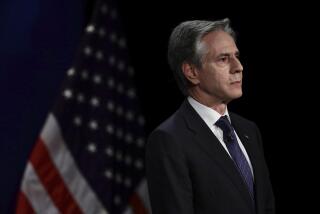Senators Condemn Kremlin Threat : Diplomacy: Economic action against Lithuania --even though it is nonviolent--imperils ties with West, delegation says.
- Share via
WASHINGTON — A delegation of U.S. senators, just back from talks with Soviet President Mikhail S. Gorbachev, condemned Moscow’s threatened economic blockade of Lithuania on Saturday and warned that repression in the Baltics, even if it is nonviolent, would have grave consequences for U.S.-Soviet relations.
“An act need not involve direct violence to be wrong,” Senate Majority Leader George J. Mitchell (D-Me.) said on behalf of the seven-member delegation. “The (blockade threat) was wrong. We condemn it.”
Mitchell said the United States must act forcefully even though the senators, all Democrats, were told repeatedly by Soviet officials that Gorbachev’s reform program, and perhaps his political life, are on the line. He said the officials cautioned Washington against taking “any action that might result in him not remaining in office.”
Sen. Thomas A. Daschle (D-S.D.) added that Gorbachev told the group that 1990 is “by far the most critical, the most crucial” year of his five years in power.
Daschle said the Soviet president “left an impression on me that he felt the Lithuanian situation was a gift to his hard-liners,” who could exploit the crisis to cripple economic and political reform.
Nevertheless, Mitchell said the United States should not tailor its response to Gorbachev’s domestic political problems.
“It is not possible for us, of course, to be in a position to precisely assess internal Soviet politics. . . . And while it is American policy to be supportive of perestroika . . . that cannot be construed as a policy which disregards any action taken by that government,” Mitchell said.
“We’re strongly supportive of our relationship with a number of other nations around the world, but no government can or should construe that support . . . as a blank check for any action they might or might not take,” he added.
The senators spoke at a news conference at Andrews Air Force Base, just outside of Washington, shortly after they completed the 15-hour flight from Moscow. They said they had no chance to talk to Gorbachev directly about the threatened economic boycott of Lithuania because the Kremlin did not issue the ultimatum until after their meeting.
Mitchell said the senators repeatedly warned Gorbachev against the use of force in the Baltics, a theme that President Bush and Secretary of State James A. Baker III also emphasized during Soviet Foreign Minister Eduard A. Shevardnadze’s visit to Washington earlier this month.
But Mitchell brushed aside a suggestion that the Americans may have left Gorbachev with the impression that Washington would not object to an action, such as the threatened economic blockade, that stopped short of bloodshed.
“By describing force and violence as unacceptable, we do not thereby sanction in advance everything else,” Mitchell said.
Meanwhile, Baker told a television interviewer in Hamilton, Bermuda, that the economic threats were “certainly an escalation of tension” but that the United States should wait to see whether the threat is carried out before deciding on a response.
Baker, in Bermuda with Bush for talks with British Prime Minister Margaret Thatcher, said implementation of the blockade would have “an adverse impact” on U.S.-Soviet relations.
“I’m simply not going to tell you or speculate with you about what actions or options or measures the U.S. might consider,” Baker told the Cable News Network. “What we have to do is wait and see whether or not this threat is carried out. . . . So far it’s only a threat.”
He added that Gorbachev’s internal difficulties are complicating relations with the West.
“Does Mr. Gorbachev have major problems? You bet your life, a lot of them,” Baker said.
Mitchell declined to suggest specific steps the U.S. government should take if Gorbachev imposes the blockade. He said the senators plan to meet soon with Bush and “it would be unappropriate for us to comment on any specific alternative before we’ve had a chance to discuss it with him.”
The Soviet government’s Tass news agency reported Thursday that Gorbachev told the senators not to lecture him about Moscow’s policy toward the Baltics.
More to Read
Sign up for Essential California
The most important California stories and recommendations in your inbox every morning.
You may occasionally receive promotional content from the Los Angeles Times.













